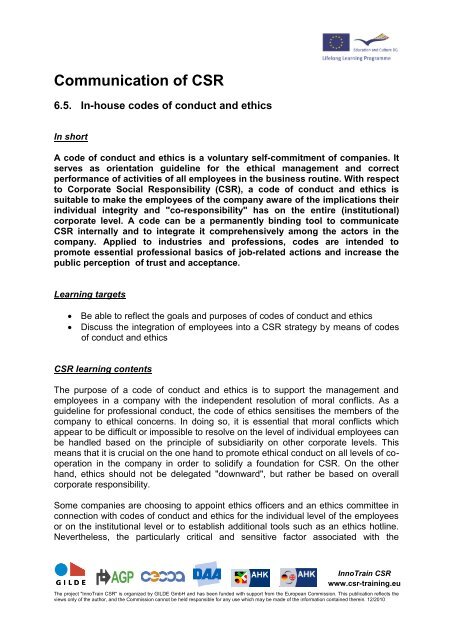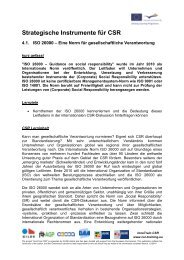What is Corporate Social Responsibility? - InnoTrain CSR
What is Corporate Social Responsibility? - InnoTrain CSR
What is Corporate Social Responsibility? - InnoTrain CSR
You also want an ePaper? Increase the reach of your titles
YUMPU automatically turns print PDFs into web optimized ePapers that Google loves.
Communication of <strong>CSR</strong><br />
6.5. In-house codes of conduct and ethics<br />
In short<br />
A code of conduct and ethics <strong>is</strong> a voluntary self-commitment of companies. It<br />
serves as orientation guideline for the ethical management and correct<br />
performance of activities of all employees in the business routine. With respect<br />
to <strong>Corporate</strong> <strong>Social</strong> <strong>Responsibility</strong> (<strong>CSR</strong>), a code of conduct and ethics <strong>is</strong><br />
suitable to make the employees of the company aware of the implications their<br />
individual integrity and "co-responsibility" has on the entire (institutional)<br />
corporate level. A code can be a permanently binding tool to communicate<br />
<strong>CSR</strong> internally and to integrate it comprehensively among the actors in the<br />
company. Applied to industries and professions, codes are intended to<br />
promote essential professional basics of job-related actions and increase the<br />
public perception of trust and acceptance.<br />
Learning targets<br />
� Be able to reflect the goals and purposes of codes of conduct and ethics<br />
� D<strong>is</strong>cuss the integration of employees into a <strong>CSR</strong> strategy by means of codes<br />
of conduct and ethics<br />
<strong>CSR</strong> learning contents<br />
The purpose of a code of conduct and ethics <strong>is</strong> to support the management and<br />
employees in a company with the independent resolution of moral conflicts. As a<br />
guideline for professional conduct, the code of ethics sensit<strong>is</strong>es the members of the<br />
company to ethical concerns. In doing so, it <strong>is</strong> essential that moral conflicts which<br />
appear to be difficult or impossible to resolve on the level of individual employees can<br />
be handled based on the principle of subsidiarity on other corporate levels. Th<strong>is</strong><br />
means that it <strong>is</strong> crucial on the one hand to promote ethical conduct on all levels of cooperation<br />
in the company in order to solidify a foundation for <strong>CSR</strong>. On the other<br />
hand, ethics should not be delegated "downward", but rather be based on overall<br />
corporate responsibility.<br />
Some companies are choosing to appoint ethics officers and an ethics committee in<br />
connection with codes of conduct and ethics for the individual level of the employees<br />
or on the institutional level or to establ<strong>is</strong>h additional tools such as an ethics hotline.<br />
Nevertheless, the particularly critical and sensitive factor associated with the<br />
The project "<strong>InnoTrain</strong> <strong>CSR</strong>" <strong>is</strong> organized by GILDE GmbH and has been funded with support from the European Comm<strong>is</strong>sion. Th<strong>is</strong> publication reflects the<br />
views only of the author, and the Comm<strong>is</strong>sion cannot be held responsible for any use which may be made of the information contained therein. 12/2010<br />
,<br />
<strong>InnoTrain</strong> <strong>CSR</strong><br />
www.csr-training.eu





